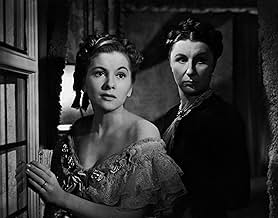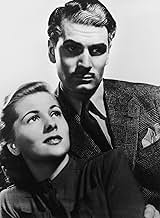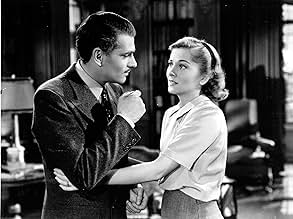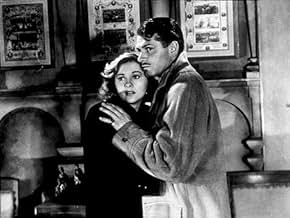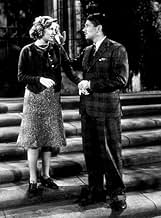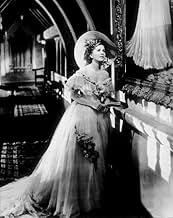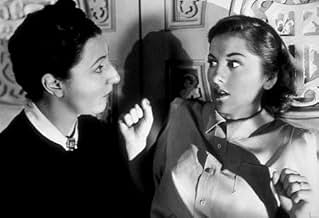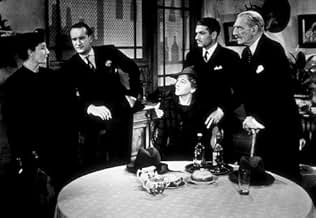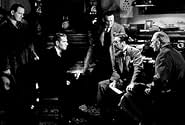Un'ingenua ventenne accetta di sposare un ricco e affascinate vedovo, e si trasferisce con lui nella splendida magione di Manderley. Ad attenderla, però, c'è l'ombra di Rebecca, la moglie de... Leggi tuttoUn'ingenua ventenne accetta di sposare un ricco e affascinate vedovo, e si trasferisce con lui nella splendida magione di Manderley. Ad attenderla, però, c'è l'ombra di Rebecca, la moglie defunta che è ancora viva nel ricordo di molti.Un'ingenua ventenne accetta di sposare un ricco e affascinate vedovo, e si trasferisce con lui nella splendida magione di Manderley. Ad attenderla, però, c'è l'ombra di Rebecca, la moglie defunta che è ancora viva nel ricordo di molti.
- Regia
- Sceneggiatura
- Star
- Vincitore di 2 Oscar
- 10 vittorie e 10 candidature totali
- Maid
- (non citato nei titoli originali)
- Policeman
- (non citato nei titoli originali)
Riepilogo
Recensioni in evidenza
"Rebecca" was the first of the director's American-made films, and it shows. It's quite different from his earlier British-made films, such as "Young and Innocent" and even "The Lady Vanishes," which somehow seem more amateurish by comparison. (I know little of the British cinema of that era, but it's difficult not to conclude that Hollywood was better at producing more sophisticated efforts.) I would even judge "Rebecca" the best of his films of the early 1940s, with the possible exception of "Shadow of a Doubt." It is true, of course, that much of this film has become cliché (remember the spoofs on the old "Carol Burnette Show"!), but it still weathers the decades very well. The acting is uniformly excellent. Olivier is the hardened Maxim de Winter, untitled lord of Manderly, trying to forget the past and given to unexpected bouts of anger and coldheartedness. Fontaine is perfect as the unnamed mousy heroine, innocent yet deeply in love, still carrying with her the aura of an awkward schoolgirl. Even character actor Nigel Bruce, best known for his role in the Sherlock Holmes films, makes an appearance and plays, in effect, Nigel Bruce!
But it is Judith Anderson's role as Mrs. Danvers that viewers are likely to remember best. Her presence is as dark and foreboding as that of the deceased Rebecca herself, and Fontaine is evidently cowed by her icy stare and unnervingly formal manner. The dynamics between the two actresses are wonderful. Who could fail to empathize with Fontaine's unenviable position as, in effect, the new employer of such an intimidating personage? On the other hand, Olivier seems quite unfearful of Anderson, despite her representing so much of the past he is trying to block out. This part of the plot (even in the book) never made much sense to me and is unconvincing.
As far as I know, this film marked Hitch's first collaboration with composer Franz Waxman, whose haunting score makes it all the more memorable. Waxman's scores are perhaps less obviously cinematic than those of the incomparable Bernard Herrmann, who would score Hitch's films from 1955 to 1966. Contrast the score for "Rebecca" to Herrmann's music for "Citizen Kane" the following year, and you'll immediately hear the difference. Waxman's is more symphonic in the central European style reflective of his own birth and upbringing. Yet it is worth recalling that scoring films was still a new art at this time, and both Waxman and Herrmann were pioneers.
Finally, one has to mention the cinematography, which is magnificent. Technically "Rebecca" might have been filmed in colour, which was newly available in 1940. ("Gone with the Wind" was filmed entirely in colour the previous year, while "The Wizzard of Oz" and "The Women" had colour scenes.) But colour would have diminished its impact. The suspense and the ominous sense of impending doom could only have been communicated through the medium of black-and-white and the deft use of light and shade which it affords.
In one respect, of course, "Rebecca" is not a typical Hitchcock film. There is no fleeing innocent trying to clear his name of a crime he did not commit. Surprisingly, there isn't even a murder, although its absence was apparently imposed by the Hayes Code and is certainly foreign to Daphne du Maurier's original novel. Some have said that there is more Selznick than Hitchcock in this film, and perhaps there's something to that. Still, if the collaborative effort between the two was not exactly amiable, it was nevertheless successful.
In short, this is the first in a string of Hitchcock masterpieces.
Most of the time the story itself moves fairly slowly, allowing the focus to be on the characters, but there are also a couple of very good plot twists, which can be very surprising if you've not seen the movie or read the novel. So if you happen not to know the story, it's a good idea to see the film before reading a lot of comments about it. Laurence Olivier, Joan Fontaine, Judith Anderson, and George Sanders are all perfectly cast and do a wonderful job bringing their characters to life, and making you feel a part of the story.
"Rebecca" should be satisfying not only to any Hitchcock fan, but to anyone who likes classic movies. Whether you like romance, suspense, or drama, they're all here, and put together by a director and cast that are masters of their art.
The movie, on the whole, is similarly amazing, capturing the spirit and the tone of those great Gothic romances. Watching Rebecca, I was reminded (pleasantly) of Wuthering Heights; I do not mean to suggest that in some way this film re-tells the tale of Cathy and Heathcliff, but rather that Rebecca has the feel of Bronte's novel (I am most certainly not talking about the William Wyler adaptation a few years before the release of Rebecca. That's a terrible film that somehow manages to mis-interpret the novel).
I must assume that the guiding hand of Hitchcock played no small role in recreating the feel of a Gothic romance. There are very few that would be able to take a love story, infuse it with such gloom, with such a sense of foreboding, and still manage to create something that ends happily without it feeling like a cop-out. I'd also like to draw everyone's attention to the incredibly moving section of the film that occurs between the arrival of the second Mrs. DeWinter at Mandalay and the masqued ball. The emotional strain on the Joan Fontaine character is so palpable, so absolutely taxing, that it actually pains me to watch. I hurt along with her. Few other movies affect me so emotionally - one of them is Vertigo.
All in all, this is a fantastic piece of film-making from Hollywood's golden age. Laurence Olivier is in top-form, as he plays the quiet, sad Maxim and George Sanders is positively hateful.
10/10 - a visceral masterpiece
This film has suspense , romance , unlimited tension , full of lingering images and with the typical touches Hitchcock . Besides , a literately and thoughtful dialog signed by Joan Harrison (Hitchcock's usual screenwriter) though lacking humor . After ¨39 steps¨and ¨Jamaica Inn¨ , Hitch was encouraged to go to America and promptly shot his first work in Hollywood hired by the great producer David O'Selznick . Fine performance by Laurence Olivier , he married Vivien Leigh and he wished to her as protagonist but Hitch hired Joan Fontaine who took seven rehearsal sessions until the engaging . Joan Fontaine as a shy bride young is superb and enjoyable . Judith Anderson as a spooky and cold house keeper is top-notch, her role as obsessed person by the glamorous Rebecca is unforgotten and immortal . Atmospheric and perceptible music by Franz Waxman and sensational visual style by the cameraman George Barnes . The picture won Academy Awards for Best film and cinematography . The movie was brilliantly directed by the Master of Suspense . It's remade in inferior versions for Television, the 1980 adaptation with Jeremy Brett as Maxim and 1996 rendition with Charles Dance and Emilie Fox . The motion picture is indispensable watching for Hithcock lovers achieving the maximum impact on his audience.
Oscars Best Picture Winners, Ranked
Oscars Best Picture Winners, Ranked
Lo sapevi?
- QuizOver 20 actresses were screen-tested for the role of Mrs. de Winter, which eventually went to newcomer Joan Fontaine. One of them was Vivien Leigh, for whom Sir Laurence Olivier was pressing, as they were a couple at the time.
- BlooperIn the outside take of Manderley seen in the scene where the Narrator stares at one window being closed, it's a miniature, as is the 'Mrs Danvers' dummy dressed in black. You can realize this by the motion of the window as it's being closed, not in a continuous way, but by little fast jumps, which look too unreal.
- Citazioni
[the new Mrs. de Winter wants to dispose of Rebecca's letters]
The Second Mrs. de Winter: I want you to get rid of all these things.
Mrs. Danvers: But these are Mrs. de Winter's things.
The Second Mrs. de Winter: *I* am Mrs. de Winter now!
- Curiosità sui creditiThe original 1940 credits read "Selznick International presents its picturization of Daphne Du Maurier's 'Rebecca'". The credits on the re-issue version read "The Selznick Studio presents its production of Daphne Du Maurier's 'Rebecca'".
- Versioni alternativeThe opening credits were re-done (with different font) for the 1950's re-release of the movie. It is these credits that have turned up on all telecasts of the film (even as recently as 2013) and all previous video releases. The Criterion release (which is now only available through outlet stores) restores all of the credits to their original form.
- ConnessioniEdited into L'ultimo tycoon: Pilot (2016)
- Colonne sonoreLove's Old Sweet Song (Just a Song at Twilight)
(1884) (uncredited)
Music by J.L. Molloy
Hummed by Joan Fontaine
I più visti
Dettagli
Botteghino
- Budget
- 1.288.000 USD (previsto)
- Lordo in tutto il mondo
- 113.328 USD
- Tempo di esecuzione
- 2h 10min(130 min)
- Colore
- Proporzioni
- 1.37 : 1



